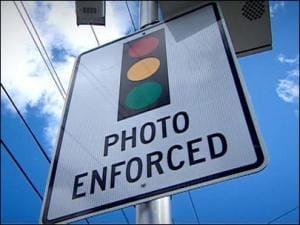Another Texas city has added revenue-enhancement, er, red-light, cameras to their budget stream, counting on residents to break the law and pay for the devices. This comes just after voters in Houston forced their city council to turn their cameras off.
According to KXAN-TV, the Austin-area city of Round Rock installed its first such camera in mid-December and now operates a half-dozen devices. Each camera reportedly costs $35,000 to install and $4,200 per month to operate.
(It’s interesting to note a starting patrol officer’s salary in Round Rock is $48,000, or $4,000 per month – which is less than the operating cost of a camera.)
Round Rock officials apparently hope people will steadily run through traffic lights so they can afford to keep them going.
Now, none of this is to excuse the law-breaking miscreants who run red-lights. In civil society, we rely on others to obey the laws. When they don’t, they deserve reprimand.
 But red-light cameras have a somewhat checkered reputation. There have been reports of the operating companies jockeying with the timing of the caution light (the “yellow” between the green-go and red-stop) so as to improve returns. A National Review article from last year touched on the constitutional case against such cameras.
But red-light cameras have a somewhat checkered reputation. There have been reports of the operating companies jockeying with the timing of the caution light (the “yellow” between the green-go and red-stop) so as to improve returns. A National Review article from last year touched on the constitutional case against such cameras.
Meanwhile, the City of Houston was recently forced by their voters to dismantle their camera program.
The Texas legislature got in on the action a few years ago, noting that it seemed cities (and the associated camera vendors) were more interested in pocketing a little extra change than actually reducing traffic accidents. So the state forced the cities to turn half of the collected fees over to a state-administered fund that supports trauma centers.
Of course, once those red-light revenues started flowing into the state treasury, the legislature didn’t actually pay out the cash – instead sitting on it as part of their smoke-and-mirrors budget-balancing gimmick in 2011. So much for aiding the trauma centers.
All too often it seems like cities around the state and nation have turned to traffic cameras as a way to generate green cash in an effort to stem the bleeding of red-ink caused by big-spending. Public safety might be the excuse, but government coffers are often the primary beneficiaries.





